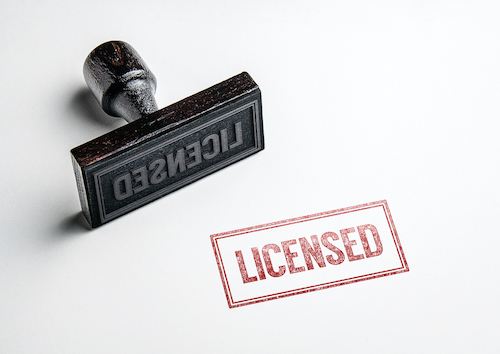Looking for the right drug rehab center? You probably have a checklist of what’s important to you in rehab. It might include specific types of therapy or a certain treatment approach.
But have you thought about drug rehab licensing?
That’s right, you should be checking to see whether a drug rehab is licensed.
Rehabs can be licensed by the Department of Healthcare Solutions (DHCS) or by a local agency. But what exactly does that mean for your recovery?
It’s hard to check for rehab licensing if you don’t know how it works. We’ve done the research on drug rehab licensing so you don’t have to. Read on to learn how to check for a rehab license and more:
What Does Rehab Licensing Mean?
The first and biggest question is—what is a rehab license and what does it mean for you?
Being licensed means that a rehab center meets all of the basic requirements for providing services.
A licensed rehab center is operating at special standards set by the government. These standards make sure that every licensed rehab provides the highest quality treatment that works.
It’s very important to choose only a licensed rehab for your recovery! Unlicensed rehabs don’t follow state-led standards. These standards exist to keep you safe in recovery.
Why Should I Check for Drug Rehab Licensing?
Licensing is an important part of choosing a drug rehab. In fact, it’s just as important as amenities, recreation, and location.
That’s because licensing is a bare minimum requirement. It’s not the same as accreditation, where the best-performing rehabs get recognition.
If a rehab isn’t licensed, it shouldn’t be operating. Rehabs that lack licenses are operating under the radar. You could be risking your recovery by choosing an untrustworthy rehab!
Are All Drug Rehabs Licensed?
All drug rehabs that operate in the U.S. are required to have a license. That includes any facility that offers:
- 1-1 therapy sessions
- Addiction education sessions
- Group therapy
- Medical detox
- Recovery prep
That’s a federal requirement that’s enforced at the state level. State- and city-level standards are different from area to area.
Who Licenses Drug Rehab Centers?
There is no federal licensing of drug rehab centers. The Department of Healthcare Solutions (DHCS) issues rehab licenses in the California. Every rehab that operates in the U.S. is required to have a similar state issued license if it offers recovery-specific services.
For state licenses, it’s different for each state. You can find out who licenses rehabs in your state by calling your local Department of Health and Human Services (DHHS).
Local Licensing for Drug Rehab Centers
Each state has its own process for issuing drug rehab licenses. In some areas, there may be city- or county-specific licensing requirements.
There are specific requirements that are different from area to area. For instance, in Pennsylvania, the requirements include:
- Specific definitions for treatment services
- Minimum staffing requirements
- Standards for narcotic treatment programs, including programs that use medication
You can find this information by contacting your local Department of Health and Human Services. If your area has a local department for alcohol and drug programs, then DHHS can refer you to the right place.
Drug Rehab Certifications
When looking for certifications, there are two main institutions that come to mind:
- The Joint Commission (JCAHO) – Is the nations oldest independent, not-for-profit accrediting body in health care. They evaluate more than 22,000 health care organizations and programs in the US.
- Commission on Accreditation of Rehabilitation Facilities (CARF) – Is an independent, nonprofit accreditor of health and human services in Behavioral Health. They currently credit more than 60,000 programs and services in over 28,000 locations.
If a drug rehab is JCAHO or CARF accredited, that means that they have gone through a rigorous evaluation to show that they meet compliance set forth by both organizations. Our directory only displays JCAHO and CARF accredited institutions. You can also visit their sites for verification.
What Questions Should I Ask?
Most clients start their drug rehab journey with a phone call. You’ll discuss your history, their programs, and have an opportunity to ask questions.
This is a chance to find out if this rehab is a good choice for you. It’s also a chance to find out about licensing!
Call your local drug rehab and ask them questions about their licensing. Those questions can include:
- What is the licensing process?
- What department issued your state license?
- Do you have proof of licensing?
- Do you have any other accreditations?
You can back up their answers by checking with the DHCS and local offices. They will be able to tell you if the rehab center has an active license.
Any reputable treatment center should be able to answer those questions with ease. If there’s any beating around the bush, then it’s time to find a new rehab. It’s very important to only choose licensed drug rehab centers.
Get Treatment at a Licensed Drug Rehab
Now you know how to find licensing for drug rehabs, it’s time to take the first step.
That’s right—it’s time to find treatment at a licensed rehab center.
Federal and state licensing means that you’re getting the very best treatment available. Rehabs that follow these strict standards provide safe, effective treatment for drug and alcohol abuse.
Your treatment options may include:
- Cognitive-behavioral therapy: CBT is a tried-and-true therapy method. It teaches you to stay mindful of your thoughts and the way they affect your behavior.
- Medication-assisted treatment: MAT is the use of medications like Suboxone to treat cravings. This can be a great tool in recovery for some clients.
Why are you still waiting to start your recovery? Call Rehab Adviser today to get your journey started!
Sources
- Alcohol and other drug program certification standards
- Licensing drug and alcohol facilities
- Requirements for establishing a drug rehabilitation center


